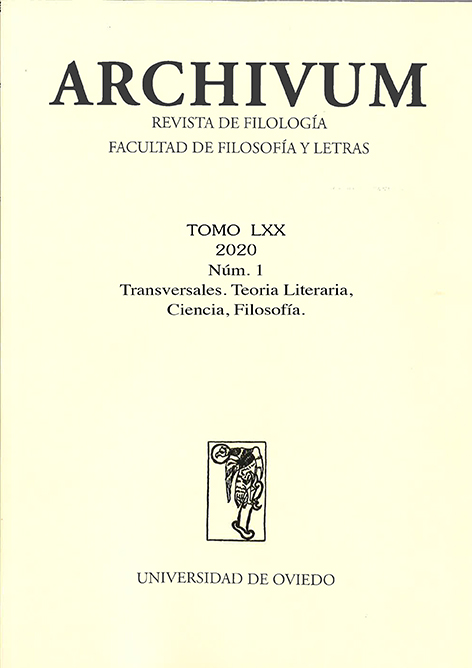Resumen
El estudio aborda el carácter interdisciplinar de la teoría literaria y expone una concepción que la sitúa como ámbito de convergencia de perspectivas científicas, y filosóficas en torno al estudio de la imaginación. Se comienza con un alegato sobre la necesidad epistemológica e institucional de dicha interdisciplinariedad y se sugiere que esta da lugar a un cuestionamiento sobre la naturaleza de los resultados que cada campo del saber proporciona. Deriva de ello una reflexión sobre el tipo de conocimiento que otorgan los estudios teórico-literarios y su singularidad con respecto a los saberes.
Dada su flexibilidad metodológica, la teoría de la literatura se halla en posición de articular razonamientos sobre los procesos que subyacen al pensamiento literario. Así, una de sus actuales funciones consiste en incorporar concepciones y herramientas de las ciencias cognitivas con un propósito analítico claro, respondiendo a un fenómeno concreto de la cognición humana cuyo reflejo encuentra en la literatura un repositorio privilegiado. El artículo glosa ejemplos de tal fertilidad concibiendo al lenguaje poético como un terreno fértil para dicha convergencia.
Se describe aquí la complejidad de la interdisciplinariedad en los estudios literarios y sostiene que la teoría literaria ha de proporcionar un material de interés humanístico, ejemplificado en la investigación de procesos específicos de la imaginación poética. Finalmente, se sugiere que la teoría literaria se halla en posición de inspirar ideas en las ciencias cognitivas mediante sus aportaciones sobre el funcionamiento del lenguaje literario y sobre la relevancia de la literatura como corpus de la conciencia humana.
Citas
Armstrong, P. B. (2013) How Literature Plays with the Brain. The Neuroscience of Reading and Art, Baltimore, Johns Hopkins.
Benedek, M., Beaty, R., Jauk, E., Koschutnig, K., Fink, A., Silvia, P. J., Dunst, Beate., Neubauer, A. C. (2014). «Creating metaphors: the neural basis of figurative language production», NeuroImage, 90(100), 99-106.
Bermúdez, V. E. (2017) Ciencia y modulación del pensamiento poético: percepción, emoción y metáfora en la escritura de Lorand Gaspar, Salamanca, Ediciones Universidad de Salamanca.
Bermúdez, V. (2017b) «Trans-diciplinas de la emoción literaria», en Schwartz, G. & Bermúdez, V. (Eds.), #Nodos, Pamplona, Next Door Publishers, 351-355.
Bermúdez, V. E. (2017c) «La disciplina del olvido: ligero tránsito por la ciencia de la memoria literaria» en Schwartz, G. & Bermúdez, V. (Eds.), #Nodos, Pamplona, Next Door Publishers, 309-314.
Burke, M. (2012) Literary Reading, Cognition and Emotion: An Exploration of the Oceanic Mind, Abingdon, Routledge.
Engell, J. (2012) “Imagination”, en Greene, R. y S. Cushman (Eds.), The Princeton Encyclopedia of Poetry and Poetics, Princeton, Princeton University Press, 666-674.
Gamoneda, A. (2018b) «De lo óptico a lo mental. La poética cognitiva de Bernard Noël», ARBOR Ciencia, Pensamiento y Cultura,194 (790), 1-13.
Gamoneda, A. (2018) «Eureka y epifanía. Diluciones cognitivas y poéticas», en Gamoneda, A. y González, F. (Eds.), Eureka, epifanía, iluminación, Abada, 45-74.
Gamoneda, A. (2016) Del animal poema: Olvido García Valdés y la poética de lo vivo. Oviedo, KRK Ediciones.
Gamoneda, A. (ed.) (2015) Espectro de la analogía. Literatura & ciencia, Madrid, Abada.
Gamoneda, A. (2014) «Sentidos seducidos. Aspectos neurocognitivos de la lectura poética (sobre un poema de Verlaine)», Signa, 23, 429-441.
Jacobs, A.M. (2015) “Neurocognitive poetics: methods and models for investigating the neuronal and cognitive-affective bases of literature reception”, Frontiers in Human Neuroscience, 9, 186.
Jacobs, A. M. (2017) “Quantifying the Beauty of Words: A Neurocognitive Poetics Perspective”, Frontiers in Human Neuroscience 11, 622.
Jaén, I. y Simon, J. J. (2016) Cognitive Approaches to Early Modern Spanish Literature, Nueva York, Oxford University Press.
Jaén, I. y Simon, J. J. (2012) Cognitive Literary Studies Current Themes and New Directions, Austin, University of Texas Press.
Kounios, J. y Beeman, M., The Eureka Factor. Aha Moments, Creative Insight, and the Brain. Nueva York, Random House. 2015.
Kraxenberger, M. y W. Menninghaus (2017) «Affinity for Poetry and Aesthetic Appreciation of Joyful and Sad Poems», Frontiers in Psychology, 7, 1-6.
Maddey, I. (2009) The Neural Imagination Aesthetic and Neuroscientific Approaches to the Arts, Austin, University of Texas Press.
Nicolescu, B. (1996) La Transdisciplinarité: Manifeste, Monaco, Éditions du Rocher.
Pokrivčák, A. y Pokrivčáková, S. (2015) «Cognition and imagination in the poetry of William Wordsworth», World Literature Studies, 7, 3-12.
Pulvirenti, G. y Gambino, R. (2013) «Imagination as Poetics of Cognition», Enthymema, 8, 85-95.
Richardson, Alan, “Imagination: Literary and Cognitive Intersections”, en Zunshine, L. (Ed.), The Oxford Handbook of Cognitive Literary Studies, Oxford, Oxford University Press. 2015: 225-245.
Stockwell, P. (2009) “Cognitive Poetics and Literary Theory”, Journal of Literary Theory, 1, 135-152.
Thompson Klein, J. (2010) “A Taxonomy of Interdisciplinary”, en Frodeman, R., Thompson Klein, J. y Mitcham, C. (Eds.), The Oxford Handbook of Interdisciplinarity, Oxford, Oxford Press, 15-30.
Tsur, R. y Sovran, T. (2012) “Cognitive Poetics”, en Greene, R. y S. Cushman (Eds.) The Princeton Encyclopedia of Poetry and Poetics, Princeton, Princeton University Press, 272-273.
Varela, F. J. y Depraz, N. (2003) «Imagining: Embodiment, Phenomenology, and Transformation» en Wallace, B. A. (Ed.), Buddhism and Science Breaking New Ground, New York, Columbia University Press, 195-228.
Vyshedskiy, Andrey (2014), On the Origin of the Human Mind. MobileReference.
Weingart, P. (2010) “A Short History of Knowledge Formations”, en Frodeman, R., Thompson Klein, J. y Mitcham, C. (Eds.), The Oxford Handbook of Interdisciplinarity, Oxford, Oxford University Press, 3-14.
Zunshine, L. (2015) The Oxford Handbook of Cognitive Literary Studies. Oxford, Oxford University Press.

